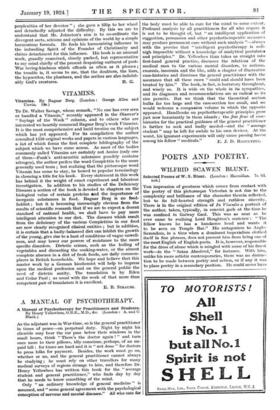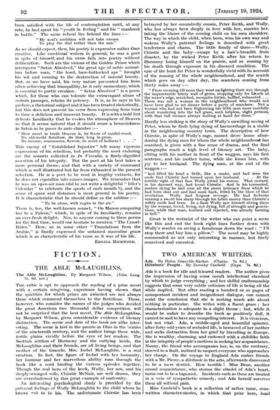POETS AND POETRY.
WILFRID SCAWEN BLUNT.
THE impression of greatness which comes from contact with the poetry of this picturesque Victorian is not due to the complexity and brilliance of the character therein reflected, but to its full-hearted strength and ruthless sincerity. There is in the original edition of In Vinculis a portrait of the author, taken, typically, in convict garb at the time he was confined in Galway Gaol. This was as near as he ever came to realizing Lord Houghton's sentence : " The fellow knows he has a handsome head and wants it to be seen on Temple Bar." His antagonism to Anglo- Saxondom, in a time when a dominant Imperialism clothed itself in fine phrases, does not prevent him from being one of the most English of English poets. It is, however, responsible for the dross of abuse which is mingled with some of his finest work—in the " Satan Absolved," for instance. With him, unlike his more artistic contemporaries, there was no distinc- tion to be made between poetry and action, or if any it was to place poetry in a secondary position. He could never have been satisfied with the life of contemplation until, at any rate, he had spent his "youth in feeling" and his " manhood in battle." The same refusal lies behind the lines :—
" My soul's ambition will not take excuse To play the dial rather than the sun."
As we should expect, then, his poetry' is expressive rather than creative. Like emotional writers in general, he was a poet in spite of himself, and his verse falls into poetry without deliberation. Such are the visions of the Golden Prime which intersperse " Satan Absolved," the great age of noble animal- ism before man, " the lewd, bare-buttocked ape " brought his wit and cunning to the destruction of natural beauty.
But, as we have said, his very nature prevented him from often achieving that tranquillity, be it only momentary, which is essential to poetic creation. " Satan Absolved " is a poem which, for those who can tolerate the extravagant abuse of certain passages, retains its potency. It is, as he says in his preface, a rhetorical subject and it has been treated rhetorically, but this does not prevent his verse from expressing from time to time a delicious and innocent beauty. It is with a bold but delicate familiarity that he evokes the atmosphere of Heaven so that it seems natural that it should rouse a homesickness in Satan as he paces its ante-chamber :— " How sweet in truth Heaven is, its floors of sandal-wood, Its old-world furniture, its linen long in press, Its incense, mummeries, flowers, its scent of holiness ! . . ."
This enemy of "Established Injustice" left many vigorous expressions of his rebellion, but probably the most enduring are the sonnets collected in In Vinculis, a finely-dignified
assertion of his integrity. But the poet at his best takes a more personal theme, and that With a variety of command which is well illustrated but far from exhausted in the present selection. He is a poet to be read in lengthy extracts, for
he does not enystallize into cameo-images. We remember that he was an open-air man (did he not write a delightful " Idler's
Calendar " to celebrate the sports of each month ?), and the sense of space and distances is most general in his poetry. It is characteristic that he should define as the sublime :- " To be alone, with eagles in the air."
There is, too, the well-known sonnet, " On Manon comparing her to a Falcon," which, in spite of its familiarity, remains an ever-fresh delight. Nor, to anyone coming to these poems for the first time, would one hesitate to mention " The Camel- Rider." Here, as in some other " Translations from the Arabic," is finally expressed the untamed masculine grace which is as characteristic of his verse as it was of his life.
EDGELL RICHWORD.











































 Previous page
Previous page